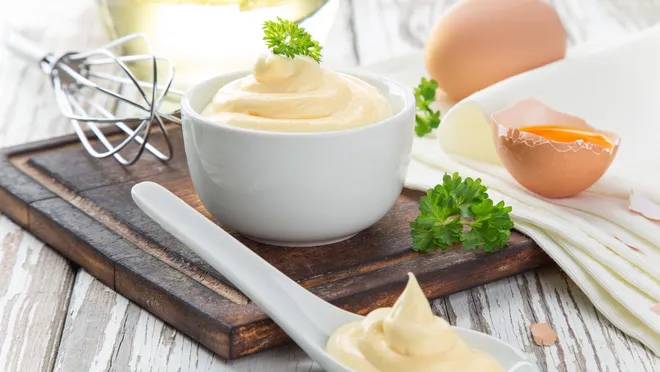It’s a tough time for mayonnaise. Over the last few decades, foreign condiments have been coming in droves to the US and stealing all the sandwiches. And it’s not just the migrants attacking America’s good, old-fashioned nutritional values; the gays are also at it. One of the top items on the Gay Agenda (US edition) is the complete elimination of mayonnaise from the American diet. We have come for your wedding cakes and now we are intent on queering your condiments. If something isn’t done soon, the mayonnaise Americans know and love won’t exist any more. Instead, everyone will be eating politically correct “identity condiments”.
Please don’t deport the messenger. I did not invent the notion of “identity condiments”, though I rather wish I had – I am simply filling you in on a viral Philadelphia magazine article called How Millennials Killed Mayonnaise. “The inexorable rise of identity condiments has led to hard times for the most American of foodstuffs,” Sandy Hingston writes. “And that’s a shame.”
Hingston’s article is less about millennials and mayonnaise, and more about the fact that America’s demographics are changing in a way many people find unpalatable. Instead of clothing her fear of a changing America in an argument about “economic anxiety”, however, Hingston dresses it up as light-hearted “gastronomic anxiety”. The article is well worth reading because it acts as an illuminating – albeit inadvertent – satire on much of the current discourse around “identity politics” and diversity.
In recent years the phrase has been used as a way to trivialize the needs and concerns of minority groups. We have been told by both the left and the right that “identity politics” are divisive. This is a maddening argument because the entire country is built on the oldest form of identity politics: the needs and concerns of rich, white men. If we are to progress, we are constantly told, we must not let ourselves get distracted by our differences but come together. Even if that means ignoring inconvenient things like systemic racism and sexism, in favour of the greater good.
Hingston makes this very argument using her mother, the daughter of Lithuanian immigrants, as an example. “The 1950s was full of strivers like Mom, desperate to forget family legacies of latkes and boxties and bramboráky … [in favour of] stars-and-stripes recipes that repped their newfound land,” she writes. “[T]he impetus seemed righteous. In a world torn asunder by the Great Depression, the Holocaust, and two world wars, our citizenry needed to come together, be united, rally behind a collective vision of what it meant to be an American.”
That collective vision, says Hingston, is perfectly encapsulated by mayonnaise. “It’s an evocation of the era I grew up in, of the homogeneity of that old, dead American dream.” This proselytizing about the artful blending of America ignores the fact that some groups were never allowed to blend in. It lays bare the fact that the collective vision of what it means to “be an American” means being white.
Hingston’s defence of mayonnaise also shines a light on another argument often employed in discussions about diversity: the idea that white men monopolize positions of power because of their God-given talents, rather than systemic biases. “Here’s the thing,” Hingston writes. “The all-American condiment didn’t have to be mayonnaise. It could have been ketchup or mustard. Hell, it could have been horseradish, but it wasn’t. It’s not mayo’s fault that it’s been so successful.”
If mayonnaise has achieved such remarkable success simply because it is a superior condiment, why should it be threatened by the appearance of a variety of different condiments, you might ask? Shouldn’t it relish (no pun intended) the new competition? Rather than explaining this with a rational argument, Hingston resorts to another familiar trope: the idea that white people are now an oppressed minority unwelcome in their own country.
“I thought young people today were supposed to be all about inclusion – about kindness and compassion and making other people feel welcome,” she laments. “So how about you include a little mayo in your picnic fare?”
You know, despite all the other “identity condiments” available today, I’m pretty sure you’ll still find that mayonnaise over-indexes in people’s picnic fare.
Last modified: January 20, 2025




